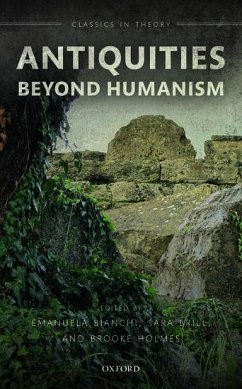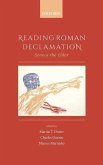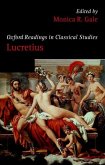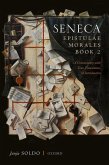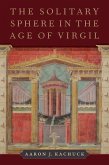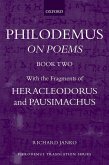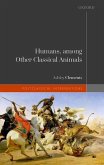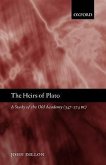Antiquities Beyond Humanism
Herausgeber: Bianchi, Emanuela; Holmes, Brooke; Brill, Sara
Antiquities Beyond Humanism
Herausgeber: Bianchi, Emanuela; Holmes, Brooke; Brill, Sara
- Gebundenes Buch
- Merkliste
- Auf die Merkliste
- Bewerten Bewerten
- Teilen
- Produkt teilen
- Produkterinnerung
- Produkterinnerung
The presumed dichotomy between a Greco-Roman paradigm of Western humanism and new theoretical currents in the humanities is exploded in this volume, which explores the myriad ways in which Greek and Roman philosophy and literature can be understood as foregrounding the non-human rather than simply reflecting the ideals of classical humanism.
Andere Kunden interessierten sich auch für
![Reading Roman Declamation Reading Roman Declamation]() Martin T DinterReading Roman Declamation186,99 €
Martin T DinterReading Roman Declamation186,99 €![Oxford Readings in Lucretius Oxford Readings in Lucretius]() Monica R. Gale (ed.)Oxford Readings in Lucretius294,99 €
Monica R. Gale (ed.)Oxford Readings in Lucretius294,99 €![Seneca, Epistulae Morales Book 2 Seneca, Epistulae Morales Book 2]() Janja SoldoSeneca, Epistulae Morales Book 2209,99 €
Janja SoldoSeneca, Epistulae Morales Book 2209,99 €![Solitary Sphere in the Age of Virgil Solitary Sphere in the Age of Virgil]() Aaron J KachuckSolitary Sphere in the Age of Virgil141,99 €
Aaron J KachuckSolitary Sphere in the Age of Virgil141,99 €![Philodemus: On Poems, Book 2 Philodemus: On Poems, Book 2]() Richard JankoPhilodemus: On Poems, Book 2215,99 €
Richard JankoPhilodemus: On Poems, Book 2215,99 €![Humans, Among Other Classical Animals Humans, Among Other Classical Animals]() Ashley ClementsHumans, Among Other Classical Animals116,99 €
Ashley ClementsHumans, Among Other Classical Animals116,99 €![The Heirs of Plato The Heirs of Plato]() John M DillonThe Heirs of Plato215,99 €
John M DillonThe Heirs of Plato215,99 €-
-
-
The presumed dichotomy between a Greco-Roman paradigm of Western humanism and new theoretical currents in the humanities is exploded in this volume, which explores the myriad ways in which Greek and Roman philosophy and literature can be understood as foregrounding the non-human rather than simply reflecting the ideals of classical humanism.
Hinweis: Dieser Artikel kann nur an eine deutsche Lieferadresse ausgeliefert werden.
Hinweis: Dieser Artikel kann nur an eine deutsche Lieferadresse ausgeliefert werden.
Produktdetails
- Produktdetails
- Verlag: Hurst & Co.
- Seitenzahl: 322
- Erscheinungstermin: 21. Mai 2019
- Englisch
- Abmessung: 218mm x 135mm x 25mm
- Gewicht: 522g
- ISBN-13: 9780198805670
- ISBN-10: 0198805675
- Artikelnr.: 54851809
- Herstellerkennzeichnung
- Libri GmbH
- Europaallee 1
- 36244 Bad Hersfeld
- gpsr@libri.de
- Verlag: Hurst & Co.
- Seitenzahl: 322
- Erscheinungstermin: 21. Mai 2019
- Englisch
- Abmessung: 218mm x 135mm x 25mm
- Gewicht: 522g
- ISBN-13: 9780198805670
- ISBN-10: 0198805675
- Artikelnr.: 54851809
- Herstellerkennzeichnung
- Libri GmbH
- Europaallee 1
- 36244 Bad Hersfeld
- gpsr@libri.de
Emanuela Bianchi is Associate Professor of Comparative Literature with affiliations in Classics and Gender and Sexuality Studies at New York University. She works at the intersection of ancient Greek philosophy and literature, French and German nineteenth- and twentieth-century philosophy, and feminist and queer theory. She is the author of The Feminine Symptom: Aleatory Matter in the Aristotelian Cosmos (Fordham University Press, 2014), and has published numerous articles in journals including Hypatia, The Yearbook of Comparative Literature, Graduate Faculty Philosophy Journal , Philosophy Today, Epochê, and Angelaki. She is currently at work on a manuscript provisionally entitled Emergence and Concealment: Nature, Hegemony, Kinship. Sara Brill is Professor of Philosophy at Fairfield University, where she has also served as Chair of the Classical Studies Program. She works on the psychology, politics, and zoology of Plato and Aristotle, as well as contemporary feminist and political theory. She is the author of Plato on the Limits of Human Life (Indiana University Press, 2013) and has published numerous articles on Plato, Aristotle, Greek tragedy, and the Hippocratic corpus. She is currently at work on a manuscript entitled Aristotle on the Concept of Shared Life, forthcoming with Oxford University Press. Brooke Holmes is Robert F. Goheen Professor in the Humanities and Professor of Classics at Princeton University. Her research centres on ancient medicine and life science, Greek literature (especially Homer and tragedy), ancient philosophy, reception studies, literary theory, and continental philosophy. She is the author of The Symptom and the Subject: The Emergence of the Physical Body in Ancient Greece (Princeton University Press, 2010) and Gender: Antiquity and its Legacy (I. B. Tauris and OUP, 2012) and has co-edited four books, including the experimental publication Liquid Antiquity (DESTE Foundation for Contemporary Art, 2017), which was accompanied by an exhibition at the Benaki Museum in Athens. She is currently at work on a book entitled The Tissue of the World: Sympathy and the Concept of Nature in Greco-Roman Antiquity and directs the research network Postclassicisms.
* Frontmatter
* List of Contributors
* 1: Emanuela Bianchi, Sara Brill, and Brooke Holmes: Introduction
* Part 1: Posthuman Antiquities?
* 2: Adriana Cavarero: The Human Reconceived: Back to Socrates with
Arendt
* 3: Ramona Naddaff: Hearing Voices: The Sounds in Socrates's Head
* 4: Michael Naas: Song and Dance Man: Plato and the Limits of the
Human
* 5: Miriam Leonard: Precarious Life: Tragedy and the Posthuman
* Part 2: Alternate Zoologies
* 6: Sara Brill: Aristotle's Meta-zoology: Shared Life and Human
Animality in the Politics
* 7: Kristin Sampson: Sounds of Subjectivity or Resonances of Something
Other
* 8: Mark Payne: Shared Life as Chorality in Schiller, Hölderlin, and
Hellenistic Poetry
* 9: Giulia Sissa: Apples and Poplars, Nuts and Bulls: The Poetic
Biosphere of Ovid's Metamorphoses
* Part 3: Anthro-excentric
* 10: James I. Porter: Hyperobjects, OOO, and the Eruptive Classics -
Field Notes of an Accidental Tourist
* 11: Emanuela Bianchi: Nature Trouble: Ancient Phusis and Queer
Performativity
* 12: Brooke Holmes: On Stoic Sympathy: Cosmobiology and the Life of
Nature
* 13: Rebecca Hill: Immanent Maternal: Figures of Time in Aristotle,
Bergson, and Irigaray
* 14: Claudia Baracchi: In Light of Eros
* Endmatter
* Index
* List of Contributors
* 1: Emanuela Bianchi, Sara Brill, and Brooke Holmes: Introduction
* Part 1: Posthuman Antiquities?
* 2: Adriana Cavarero: The Human Reconceived: Back to Socrates with
Arendt
* 3: Ramona Naddaff: Hearing Voices: The Sounds in Socrates's Head
* 4: Michael Naas: Song and Dance Man: Plato and the Limits of the
Human
* 5: Miriam Leonard: Precarious Life: Tragedy and the Posthuman
* Part 2: Alternate Zoologies
* 6: Sara Brill: Aristotle's Meta-zoology: Shared Life and Human
Animality in the Politics
* 7: Kristin Sampson: Sounds of Subjectivity or Resonances of Something
Other
* 8: Mark Payne: Shared Life as Chorality in Schiller, Hölderlin, and
Hellenistic Poetry
* 9: Giulia Sissa: Apples and Poplars, Nuts and Bulls: The Poetic
Biosphere of Ovid's Metamorphoses
* Part 3: Anthro-excentric
* 10: James I. Porter: Hyperobjects, OOO, and the Eruptive Classics -
Field Notes of an Accidental Tourist
* 11: Emanuela Bianchi: Nature Trouble: Ancient Phusis and Queer
Performativity
* 12: Brooke Holmes: On Stoic Sympathy: Cosmobiology and the Life of
Nature
* 13: Rebecca Hill: Immanent Maternal: Figures of Time in Aristotle,
Bergson, and Irigaray
* 14: Claudia Baracchi: In Light of Eros
* Endmatter
* Index
* Frontmatter
* List of Contributors
* 1: Emanuela Bianchi, Sara Brill, and Brooke Holmes: Introduction
* Part 1: Posthuman Antiquities?
* 2: Adriana Cavarero: The Human Reconceived: Back to Socrates with
Arendt
* 3: Ramona Naddaff: Hearing Voices: The Sounds in Socrates's Head
* 4: Michael Naas: Song and Dance Man: Plato and the Limits of the
Human
* 5: Miriam Leonard: Precarious Life: Tragedy and the Posthuman
* Part 2: Alternate Zoologies
* 6: Sara Brill: Aristotle's Meta-zoology: Shared Life and Human
Animality in the Politics
* 7: Kristin Sampson: Sounds of Subjectivity or Resonances of Something
Other
* 8: Mark Payne: Shared Life as Chorality in Schiller, Hölderlin, and
Hellenistic Poetry
* 9: Giulia Sissa: Apples and Poplars, Nuts and Bulls: The Poetic
Biosphere of Ovid's Metamorphoses
* Part 3: Anthro-excentric
* 10: James I. Porter: Hyperobjects, OOO, and the Eruptive Classics -
Field Notes of an Accidental Tourist
* 11: Emanuela Bianchi: Nature Trouble: Ancient Phusis and Queer
Performativity
* 12: Brooke Holmes: On Stoic Sympathy: Cosmobiology and the Life of
Nature
* 13: Rebecca Hill: Immanent Maternal: Figures of Time in Aristotle,
Bergson, and Irigaray
* 14: Claudia Baracchi: In Light of Eros
* Endmatter
* Index
* List of Contributors
* 1: Emanuela Bianchi, Sara Brill, and Brooke Holmes: Introduction
* Part 1: Posthuman Antiquities?
* 2: Adriana Cavarero: The Human Reconceived: Back to Socrates with
Arendt
* 3: Ramona Naddaff: Hearing Voices: The Sounds in Socrates's Head
* 4: Michael Naas: Song and Dance Man: Plato and the Limits of the
Human
* 5: Miriam Leonard: Precarious Life: Tragedy and the Posthuman
* Part 2: Alternate Zoologies
* 6: Sara Brill: Aristotle's Meta-zoology: Shared Life and Human
Animality in the Politics
* 7: Kristin Sampson: Sounds of Subjectivity or Resonances of Something
Other
* 8: Mark Payne: Shared Life as Chorality in Schiller, Hölderlin, and
Hellenistic Poetry
* 9: Giulia Sissa: Apples and Poplars, Nuts and Bulls: The Poetic
Biosphere of Ovid's Metamorphoses
* Part 3: Anthro-excentric
* 10: James I. Porter: Hyperobjects, OOO, and the Eruptive Classics -
Field Notes of an Accidental Tourist
* 11: Emanuela Bianchi: Nature Trouble: Ancient Phusis and Queer
Performativity
* 12: Brooke Holmes: On Stoic Sympathy: Cosmobiology and the Life of
Nature
* 13: Rebecca Hill: Immanent Maternal: Figures of Time in Aristotle,
Bergson, and Irigaray
* 14: Claudia Baracchi: In Light of Eros
* Endmatter
* Index

